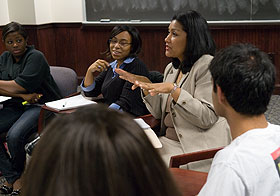  |
| HOME | THIS ISSUE | CALENDAR | GRANTS | BACK ISSUES | < BACK | NEXT > |
Williams recognized for teaching, mentorship of grad studentsby Sherry Fisher - November 26, 2007 | ||||
| Michelle Williams had always thought that teaching was a skill “some people had” – and some people didn’t. “I didn’t think that I was one of those people who had it,” says Williams, an associate professor of psychology and director of clinical training. “I had great admiration for teaching and teachers,” she says. “I credit my entire academic success to a handful of amazing ones, from elementary school through college. I know what good teaching is. I just never thought I’d be good at it.” That’s obviously not the case. Williams recently received an award from the Alumni Association for faculty excellence in teaching at the graduate level. “When I came to UConn in 1996, I was encouraged by mentors who thought I was well suited for teaching, so I gave it a shot,” Williams says. “It was my first job.” She also has a joint appointment with the Institute for African American Studies. Williams earned a bachelor’s degree in psychology from Emory University, and a Ph.D. in psychology from the University of Georgia. For many years, she had considered a career in medicine. After taking her first psychology course in college, however, she found her true calling. Williams enjoys teaching both undergraduate and graduate students, but says a faculty member’s role with grad students is more that of a mentor. “Graduate students come in very eager with a strong set of skills,” she says. “You can really mentor them and watch them evolve as they move from student to junior colleague. It’s so rewarding to see them in your role just five or six years later.” Williams says that teaching graduate students extends beyond the classroom. “You’re mentoring them in their research, work-life balance, and career decisions,” she says. “You’re really involved in their lives.” The graduate students that work with Williams seek careers in academia or in clinical settings. When they graduate from the University, they still call her for advice. “The students who are in academic positions still see me as a mentor,” she says. “I’m in regular contact with them.” She recalls the words of George Allen, a professor emeritus of psychology who was one of her mentors: “A good mentor is able to envision the future for the person being mentored, understands what is necessary to be successful, and ultimately provides the resources, skills, and opportunities to make the future a reality. Even when the student doesn’t believe it is possible, the mentor is absolutely convinced of it.”
Williams says her job “is having students believe in that possibility.” What is exciting, she says, is “that moment when you see the student no longer needs to be convinced that it’s possible. They’re doing it. They believe it.” Her former students agree. Allison Ponce is now teaching at Yale. “Michelle’s unwavering enthusiasm and encouragement led me to feel confident in exploring my identity as a budding psychologist,” she says. “While Michelle has been an excellent mentor, she also has exemplary skills as a classroom teacher.” Ponce adds, “I try to incorporate aspects of her teaching style into my own, and if I have a fraction of the positive impact on my students that she has had on me, I would consider myself lucky.” Amber Douglas, who is now teaching at Mount Holyoke College, says Williams was a “phenomenal teacher” and “a constant resource and source of support” as an advisor. “She was available to serve as an informal supervisor in terms of clinical work, a sounding board for ideas, an editor and reviewer of proposals, and an audience for practicing presentations.” Douglas adds, “She is a force, and deserves as much positive recognition as can be lauded upon her.” Roxanne Donovan says, “Michelle embodies all the qualities of an excellent professor. She is caring, compassionate, knowledgeable, and extremely dedicated. “As an instructor, Michelle is without equal,” says Donovan, who now teaches at Kennesaw State University. “She brings her humor, insight, and expertise into every course she teaches.” Donovan says, “Unlike teacher ratings, a professor’s gift to inspire students to achieve their goals is not particularly quantifiable, yet it is an extremely important component in a student’s positive collegiate experience. She regularly goes above and beyond her professional duties to help her students succeed.” Williams says she wants her students to be critical thinkers. “I want them to always see what they’re doing as a process of learning and discovery,” she says. “I also want them to have a holistic sense of who they are. That means personal growth, self-care, and balance. They need to see themselves as multifaceted: You’re a parent; you’re a sibling; you’re a spouse; you’re a friend; ou’re a citizen of the world. All these things matter as much as being a psychologist. I don’t believe you can be fully happy in any one role if the other parts of your life aren’t meaningful and fulfilling.” |
| ADVANCE HOME UCONN HOME |

